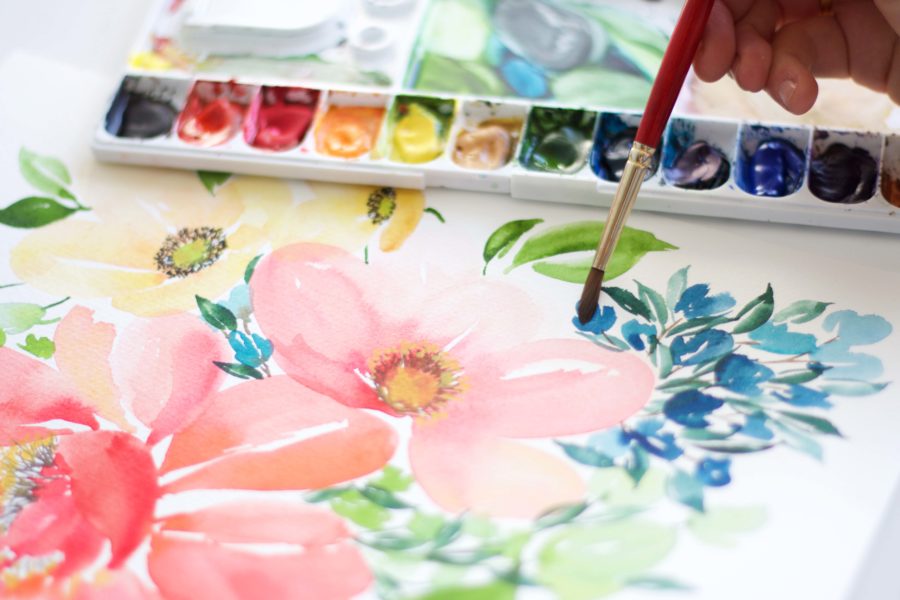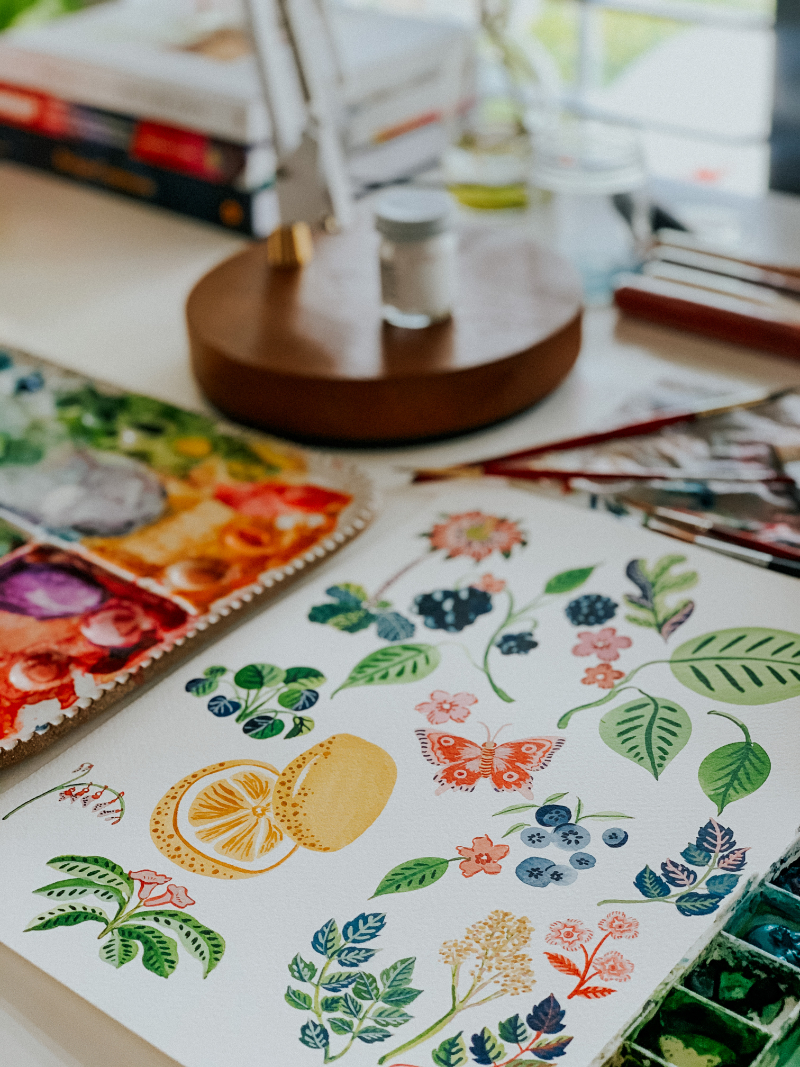We are all inspired and we are all thieves.
If you're reading this and you're an artist, designer or in some form of a creative field, you have copied another. Every one of us has. Just accept that, let your brain digest it… ok! Now it's time to move on.
As an artist you are only a link in a chain, and whatever you find or whatever you do not find, you can find comfort in it.
Vincent Van Gogh
In referencing the quote above by Van Gogh, there will always be an artist before us and there will be artists after us…we're all links in a chain and this chain is helping the discipline and practice of art and creativity evolve. Evolution is good and copying is a part of that process.
While I am not saying that copying is good (I will define that in a minute), there are obvious circumstances where it is ok to copy: when you're first learning.
Copying is the only way to get your bearings when you're first starting out.
One must literally reference or be taught to replicate a piece in order to develop and train their technical muscles. This has been a long-standing tradition in the art world – copying the Masters (there are college classes on teaching and learning the paintings of Rembrandt and Degas, etc.) – and one that is carried over into learning situations today:
- Every beginner guitarist will learn and play (nonstop) the riff to Stairway to Heaven and try to play it exactly like Jimmy Page
- Painters recreate variations of Van Gogh's The Starry Night in high school art class and give it to their moms to put on the fridge
- Developers copy code directly from a site or book they come across (trust me, just watch Halt and Catch Fire on Netflix)
This is called learning by the experience of doing. Copying helps you better understand how something is made all while teaching the learner technique and developing muscle memory. When I was first learning watercolor I did this! But there's a time to copy and then there's a definite time to not copy. Here's the difference:
It is ok to copy to learn. It is NOT ok to replicate or copy someone's work to pass it off as your own and use it for marketing or commercial purposes.
This is in fact why there are copyright laws and intellectual property lawyers.
Here's the thing. It's really hard these days to be completely pure in your work. Inspiration is everywhere: it's easily searchable and something we stumble into often by scrolling on Instagram and Pinterest, and who knows just how much a quick glance through social media is actually seeping through our minds and impacting our ideas, our creative process, etc. BUT, there are a couple key points that I want to share with you from my own experience over the last couple of years that I hope will help you understand the deeper impact of copying.
Copying ensures that you will never find YOUR truly unique voice. Ouch.
Think about it.
Replicating other people's work, while it will help you grow when you're a beginner, will hurt and stunt your growth as an artist. Are you constantly having to look at an artist's work for ideas? If a client came to you and asked you to paint a banana leaf tree, for example, would you be able to do that by looking at the actual subject or photograph of a banana leaf tree, or do you need to pull up your favorite artist's Instagram profile first to replicate his/her banana leaf tree painting?
Then, what do you do when that artist doesn't have a painting of a banana leaf tree?
If you're devoting your energy and time to copying work, you will have spent all of that valuable effort on something that may seem like it's helping you at first (you're getting likes and comments, maybe some sales and recognition), but the damage you're doing to your career, in the long run, can be detrimental.
Copying hurts the industry as a whole.
The longer people go on copying, the more damage that person is doing to the entire industry. People have worked harrrrd at developing their skills, sharing them with their community, pouring their time, money and energy, and someone who comes along and copies that artist is essentially undercutting and devaluing the hard work and effort it takes to truly be an artist. Copiers typically weaken the market by coming in with little experience, getting good at replication, and selling or advertising their copy for less than the industry standard. This devalues the work that goes into developing your own style and unique voice and softens the consumer as a whole towards what he or she should be paying for creative products and services.
Copying is a really bad idea.
About a year ago I wrote and sent my first Cease and Desist letter. There had been a couple instances prior to me having to write to this particular person that came to my attention via being tagged by my followers on Instagram (you guys are awesome). I'd chosen to ignore these other cases where previous students of mine have copied my work… I see it a lot, and when I see most of these posts my initial reaction is hurt and sadness, but up until this particular instance, I did nothing about it. In this particular case, huge sections of my copy and artwork from my how-to watercolor book had been literally retyped and painted word for word and used in someone's workshop handout/material. Now, normally I don't take action because of everyone copies. And with that too, there can be so many nuances and small details from work to work, that copyright law can't protect you all that much unless your work is actually being rescanned or your text is being plagiarized. But because this particular case was repetitive, this person was making a profit off of my tutorials AND I could see the damage it was doing to the industry, I sent a kindly, but firmly worded email. Thankfully I have a legal team I work with on this stuff, so if things ever do need to get serious, I've got backup…but normally, a “hey, I saw that you've been…” gets them to recognize what they're doing right away. Save the attorney for later when/if necessary.
Now, I do believe there are similarities and trends within industries that can't be ignored. Some techniques and practices in watercolor have been around for ages that are just now resurfacing and making a come back because of trends and social media. People's work looks similar because of this. Artists are sharing their tools and their supplies for the medium they work in, other people are buying those brands based off of recommendations, therefore, other people's work is bound to have similar colors and such to theirs. That's just fact.
But, I don't want this to be just another post about the dos and don'ts of copying, or copying vs. inspiration, etc.
I do think that listing what copying does overall, as I did above, is incredibly important and sharing my own personal experience helps to give credibility and validity… but when I see people copying my work, I'm really not worried about it affecting my career, I'm not worried I won't get the deserved recognition or payment, etc…in fact it's not worrying to me at all. I feel sad because what copying truly shows me is that that artist doesn't believe in his/her own work. They believe their own work, their own voice isn't good enough, therefore they copy.
And this, my friends, couldn't be further from the truth!
Every single one of us has the ability to create, it's how we're wired. Having our own style and voice is also something I strongly believe EVERYONE can do over time. It's something I advocate for in my classes and in my books. Sometimes that journey takes copying other's work for longer to learn and for everyone it takes hard work! Again, I'm not saying that everything can be completely pure and one of a kind, nor am I saying that you should copy for as long as you want to – there's a fine line there. What I do believe is this:
- Don't be lazy
- Give credit where it's due
Side Note: If you're copying to learn, but then posting that work on social media without giving credit to where you learned it, yes, that is copying – social media is an advertising tool, it is how people discover you as an artist.
- Accept EVERY SINGLE part of your journey as an artist – don't try to rush it
If we weren't always trying to paint like that person, or write like that blogger, etc. we'd be able to focus on our own craft, our own voice… take the time to nurture and care for it each step of the way. If the results aren't showing up that week, and all your attempts are ending up in the trash, be OK with it! That's a part of the process…don't try to rush it by copying someone else's work and showing the world look what I did today just to say you did something.
Treat your story with care and your voice with respect. It may seem like it's hiding sometimes, but it's there!
Subscribe & Review
If you had an ah-ha! moment or learned just ONE new valuable bit of information, I'd be so grateful if you would leave a 5-star review and tell me what you love most about this podcast. It's a HUGE motivator for me to keep creating this for you. In addition, it helps our raking in iTunes so that more people discover this show.
And to make sure you never miss an episode (including any pop-up bonus episodes), click here to subscribe on Apple iTunes!
Related Episodes
Episode 11: Tips for Finding Your Artistic Style
Episode 9: Tips for Overcoming Imposter Syndrome
Episode 12: Pricing Woes? The Formula for Developing YOUR Price
Episode 59: Informative Shopping Research with Julie Turkel
Episode 45: Is It Too Late to Start?
















Great blog and so true! Thank you.
Thank you so much for your clarity and thoughtful insight.
You continue to inspire and share.
Those of us who are learning are greatful to have you along in our journey to find our own voice. ??
Thank you,
M
I want to look at Instagram and see what is current, but I’m scared because this influences my ideas.
When my dad was an artist there was no internet, so only art shows and a few magazines saw his work.
As a beginner artist, I appreciate this post and it’s clarity. Yes, copying is how we learn. The comments on social media and giving credit where it is due is especially helpful. Thanks!
I have been a Textile designer & artist for more than 25 years, Instagram has changed a lot the rules of the game, and this is the first time someone addresses the copping issue clearly. There is a difference between inspiration and copying, and it confusing where one starts and the other one begins. Thank you for creating the line in between again!
Great article.
I am a published other of many non fiction books and magazine articles.
My very ‘favourite’ example ‘copying’ was when a person completely copied one of my example pro formas, deleted my name and then wrote ‘copywrite of ‘ and inserted her own name.
Yes, you read that correctly – copywrite was written just like that!
It works very well for me
This is truly helpful, thanks.
Hi, I do believe this is an excellent blog.
I stumbledupon it 😉 I’m going to revisit yet again since i have bookmarked it.
Money and freedom is the best way to change, may you
be rich and continue to help other people.
I remember going to hear Maurice Sendak (author of Where the Wild Things Are) speak. He said that artists make “swipe soup,” which includes ingredients and bits from all of their influences. He stated that the most important thing was that, as an artist, you don’t add too much from anyone else because it will taste pretty bad. Loved that…AND this post! Thank you. ♥️
Jenna,
I’m interested in becoming a wedding calligrapher and have been working diligently on my calligraphy skills. There are some calligraphers I admire who do wedding work using a script I like. Is it okay for me to work on learning that script? Is a script something that can belong to a person? I’m not even sure what question I’m really asking here, but if I have a business and do something similar to what someone else is doing, how do I deal with that? Or do I? Thanks for all the great info you share for free. I appreciate it so much and hope to be able to afford your Pen to Press class soon!
Love this. I am in coding bootcamp and I stare at the screen relying on imperfect memory to conjure up the right code that I need because I felt that copying was always wrong. Then I realized that some copying is OK. So I Googled “Does copying help you learn?” and found this. Super helpful because a lot of coding is referencing some other class exercise, copying a line of code and or altering it slightly to fit the current activity. When we learn the alphabet, we are copying, we recite, and memorize. We don’t teach small children the complex nature of language and why we use it, or why we have the alphabet we have. We don’t teach them the entire history of all the world languages, nope! We teach them the alphabet first. I truly value this article and it has validated my desire to search code blogs, ask ChatGPT, and literally copy code – for the right reasons. Yes, I will cite my sources if it’s something we didn’t learn in class. But I am not even 2 months in and the teacher instructs us not to bother memorizing. Copying to learn is OK! Then once you know a little bit of what you’re doing, you have to challenge yourself to try and figure things out.